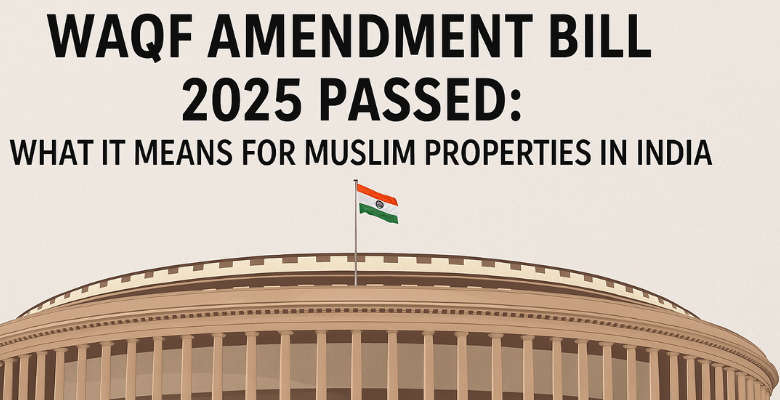Waqf Amendment Bill 2025 Passed: What It Means for Muslim Properties in India

Waqf Amendment Bill 2025 Passed: What It Means for Muslim Properties in India
India just witnessed a fiery debate that lasted nearly 14 hours in the Parliament. The topic? The Waqf Amendment Bill 2025. This new legislation has sparked a nationwide conversation, drawing sharp reactions from both sides of the political spectrum. But what exactly is this bill about, and why is it causing such a stir? Let’s break it down in simple terms.
Contents
What Is the Waqf Amendment Bill 2025?
The Waqf Amendment Bill 2025 is a new law that aims to bring major changes to how Muslim properties — also known as waqf properties — are managed in India. Waqf properties are lands or buildings donated by Muslims for religious or charitable use, such as mosques, schools, or graveyards.
The government says the goal of the bill is to increase transparency and accountability. But opposition parties argue that it infringes on the rights of the Muslim community.
What Happened in Parliament?
- The Rajya Sabha passed the bill after a long 14-hour debate, with 128 votes in favour and 95 against.
- The Lok Sabha had cleared it earlier by a wider margin.
- The bill now awaits the President’s approval to become law.
Key Highlights of the Bill
Here are the main points of the Waqf Amendment Bill 2025:
- Proof of Ownership
- Waqf Boards will now need valid documents to claim any property as waqf.
- In case of dispute, the government will make the final call.
- Inclusion of Non-Muslims
- Non-Muslim members can now be part of the Waqf Board and Central Waqf Council.
- This change drew heavy criticism from the opposition.
- Centralised Registration
- All waqf properties must be registered within six months of the law being passed.
- Any new property to be claimed as waqf must go through a central system.
- Legal Disputes Can Go to Court
- Earlier, waqf tribunal decisions were final.
- Now, courts can intervene in property-related cases.
- More Government Oversight
- The government will have a larger role in surveying and managing waqf properties.
Why Is It Controversial?
Opposition parties and several Muslim leaders claim the bill:
- Undermines the independence of the Waqf Board
- Treats Muslims as “second-class citizens”
- Violates constitutional rights of religious minorities
- Adds unnecessary government control over religious institutions
Congress MP Syed Naseer Hussain called the bill a “targeted legislation” meant to polarise voters. He also criticized the inclusion of non-Muslims in the Waqf Board, asking, “Would a Muslim be allowed in a Hindu temple trust?”
What Does the Government Say?
Union Minister Kiren Rijiju defended the bill, saying it aims to clean up mismanagement and corruption.
He explained:
- Waqf Boards are statutory, not religious bodies — hence, they should be secular.
- Only four non-Muslim members will be allowed in the 22-member Central Waqf Council.
- These members cannot control decisions — they are there to contribute.
JP Nadda, another senior leader, accused the opposition of hypocrisy, especially regarding women’s rights. He reminded Parliament that other Muslim-majority countries have already introduced such reforms.
What Did CM Yogi Adityanath Say?
Uttar Pradesh Chief Minister Yogi Adityanath supported the Waqf Amendment Bill 2025. During a public speech in Maharajganj, he said:
“No one will be able to rob lands in the name of Waqf Board now.”
He alleged that in the past, corrupt individuals used the Waqf Board to illegally occupy public land. According to him, this land should instead be used to build schools, hospitals, and houses for the poor.
Voices of Protest
The opposition did not hold back:
- Some MPs wore black as a symbol of protest.
- Sanjay Raut (Shiv Sena UBT) said the BJP’s sudden concern for Muslims would put Pakistan’s founder to shame.
- Imran Pratapgarhi (Congress) questioned the government’s priorities, citing international issues happening at the same time.
- Sanjay Singh (AAP) accused the government of turning a blind eye to scams in temple properties while focusing on Waqf land.
Also read | Agilus Diagnostics – Dr. Phadke Labs In Kandivali West 400067
What Happens Next?
- The bill will become law once signed by the President of India.
- Legal experts like Asaduddin Owaisi have already challenged it in the Supreme Court.
- Muslim organisations and political leaders are expected to keep raising concerns.
Whether you support or oppose the Waqf Amendment Bill 2025, one thing is clear — it’s not just a law, it’s a turning point in how religious and community properties are governed in India.
This bill affects millions, and its long-term impact remains to be seen.
For more detailed and unbiased updates on such important national topics, keep following Bharat Details.

